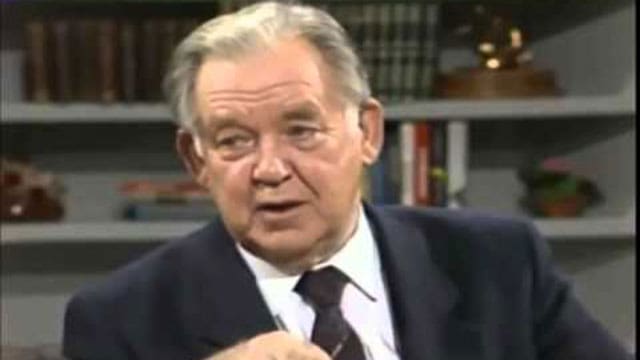The fascinating life and career of Jack Webster, the legendary broadcaster and journalist
 Superstar talk show host and newspaper reporter Jack Webster kept his Scotch brogue. He preferred the term “Scotch” to “Scottish,” and he enjoyed the beverage. In keeping with the fabled stories of journalists, Jack left school in Glasgow at age 14 to write for newspapers, including on London’s Fleet Street.
Superstar talk show host and newspaper reporter Jack Webster kept his Scotch brogue. He preferred the term “Scotch” to “Scottish,” and he enjoyed the beverage. In keeping with the fabled stories of journalists, Jack left school in Glasgow at age 14 to write for newspapers, including on London’s Fleet Street.
When the Second World War broke out, he enlisted, and Major Webster spent most of his time in the Middle East. After the war, he emigrated to Canada and covered the labour beat for the Vancouver Sun. In 1953, he began to work in commercial broadcasting in the talk radio format.
One of the reasons Vancouver is such a great media town is that it helped invent the talk format that spread everywhere thereafter. Jack made a big name for himself by broadcasting reports of testimony about police corruption in Vancouver for CJOR.
He moved to CKNW, also in Vancouver, in the 1960s, where he had 186,000 daily listeners. That was more than one-quarter of the entire population of Vancouver. In 1963, prisoners at the BC Penitentiary took hostages in an escape attempt. Prisoners requested that Webster be the mediator. He helped avert tragedy.
 |
| More from Allan Bonner |
| The Secret Service has a shocking history of failure
|
| Inside Scoop: The greatest TV blooper of all time
|
| The day I sang for iconic crooner Tony Bennett
|
In 1972, billionaire entrepreneur Jim Pattison lured Webster back to CJOR. Then, in 1979, at 60, Webster moved his radio show to television, where his familiar expression ‘9 a.m. prrre-cisely’ became a trademark. This hour-long interview program, Webster!, was seen weekdays at 9 a.m. and later at 5 p.m., proceeding the nightly news hour.
Webster joined the long-running CBC TV program Front Page Challenge as its permanent fourth panelist until the show’s cancellation in 1995.
In 1987, he was inducted into the Canadian News Hall of Fame and in 1988, he was made a Member of the Order of Canada.
Jack was a commentator on at least one federal election covered by the CTV network. On the same broadcast was John Bassett, who had founded and owned the flagship Toronto station, CFTO. “Ak …” Jack said, “so, you’re the owner. I’ll tell you then I like my Scotch over ice at the end of the broadcast” (or words to that effect).
He’d identify himself and his program on radio with a signature – “Websterrrrr … CJOR-RRRR…681 9181 …” Yes, both his name and radio station sounded as if both had five Rs at the end.
When a caller had reached the end of the road, Jack would interject: “Ak, you’re daft … get off the line.”
The big difference between Jack and me was when I worked with him? I made about $25,000 per year while he made about $250,000. He was more than double my age. I was in my early 20s.
When I (and most other TV reporters) ended an interview with a union spokesperson selling a hard anti-management line, I’d say, “That was Joe Blow, president of Local 101. We’ll be right back.”
Not Jack. He reportedly once turned to the camera and said, “Ak … it’s enough to mak ya puke.”
For a big man in the big time, Jack was remarkably generous with me.
One story I broke on CBC TV’s supper hour broadcast, “Hourglass,” involved the state of the staff cafeteria at Vancouver’s International Airport. It was run by the food service company Cara, and workers had various complaints. When I had a story in my teeth, I kept it alive for days. I got in behind security and shot an interview with a complainant, which caused a Cara official to comment, each day upping the ante and ramping up interest.
One day, the door to Hourglass’ offices opened and there was Jack – a regular contributor. Up ran a mild-mannered female researcher who said, “Jack, you’re going to interview West German Chancellor Helmut Schmidt, and I have a file for you …”
“Ak … I don’t want your … file. Get away from me …” The researcher seemed to know Jack was just imitating Jack and no offence was given or taken. He then turned toward the Executive Producer’s office – Chris Payton – the first female Exec in the CBC system. But before taking a step to Payton’s office and the scotch therein, Jack turned to me, pointed, and said: “That was a good job on Cara laddy …” For Jack, Cara had four Rs.
Seeing Jack on the way in for a drink, Payton commandeered a coffee carafe of water to go with the scotch.
A couple of my colleagues approached me and said, “Jack never does that.” It was a rare and high compliment.
I only worked with Jack for a few months in Vancouver, but years later, I saw him at the Ottawa airport and walked over.
“We worked together on Hourglass, Jack.”
“NAME?” Jack demanded.
When I told him, no kidding, he said, “Ak eye, the Cara story.”
Years later, I saw Jack in Chin Chin, a restaurant in Vancouver. I wrote a note on my business card and had a server take it to him. Almost instantly, I saw Jack meandering across a large dining room to my table. I leapt up to meet him halfway and we chatted amicably.
I’m not sure if Jack realized that, while being gracious, collegial, and larger than life, he was also creating wonderful memories for me that have lasted for decades.
Dr. Allan Bonner was the first North American and the only Canadian to earn an MSc in Risk, Crisis, and Disaster Management from Leicester University in the UK, the only institution in the world offering a full graduate program in this field. Throughout his career, he has tackled some of the most complex issues of our time, including Hong Kong’s return to China, projects for the European Union, NATO, UN agencies, the WTO, the Taser Project, and many other significant challenges.
For interview requests, click here.
The opinions expressed by our columnists and contributors are theirs alone and do not inherently or expressly reflect the views of our publication.
© Troy Media
Troy Media is an editorial content provider to media outlets and its own hosted community news outlets across Canada.

